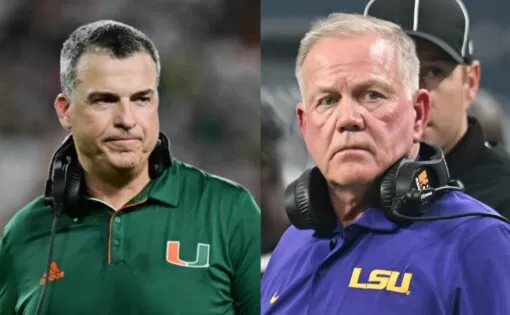When it comes to NIL conversations in college football, there always seems to be a mention of the University of Miami. And this year, the spotlight is on head coach Mario Cristobal, who currently holds the second-highest NIL deal in the country, thanks to quarterback Carson Beck. With a whopping $4 million deal, it’s no surprise that the community is anticipating similar moves from the Miami staff to secure another top player. However, recent reports suggest that Cristobal has bowed out of a potential bidding war with LSU’s new coach, Brian Kelly, as Miami has reportedly rejected the top target’s $2 million demand.
The competition for top-tier athletes has always been fierce in college football, and with the introduction of NIL deals, the pressure has only increased. Universities and their respective coaching staff are now put in a tricky situation of balancing their team’s dynamic and budget while also meeting the demands of potential recruits. And Miami, with its reputation of being one of the top programs in college football, is no exception.
Under Cristobal’s leadership, Miami has made significant strides in recruiting and securing top talent. However, the recent report of rejecting a top target’s $2 million demand has raised eyebrows among the Miami community. With the program’s history of aggressively pursuing top players, the decision to pass on this particular high-profile player has surprised many.
The report of Cristobal bowing out of a potential bidding war with LSU’s Brian Kelly further solidifies the Miami coach’s reputation as someone who values the program’s financial stability over short-term success. With Kelly making headlines for his massive $15 million deal with LSU and his statement of being “unafraid to spend money,” many expected Cristobal to follow a similar approach. However, the recent rejection indicates that the Miami program’s financial limitations may mirror Cristobal’s own philosophy of investing in long-term success rather than quick fixes.
While this news may have disappointed some Miami fans, it also brings to light the competitive nature of the NIL landscape. With more and more top programs shelling out millions for NIL deals, it’s becoming increasingly challenging to keep up, especially for a program like Miami, which has faced financial struggles in recent years. And while some may criticize the decision to reject a potentially game-changing player, it also showcases the program’s commitment to building a sustainable and successful team.
As for Cristobal, this move further cements his reputation as a coach who prioritizes the overall well-being of his program over individual players’ demands. And while it may not generate as much hype as a $4 million NIL deal, it sends a message to both current players and potential recruits that Miami is a program built on discipline, integrity, and long-term success.
It’s also worth noting that this move doesn’t mean that Cristobal and his staff aren’t actively pursuing top talent. On the contrary, the rejection of this particular $2 million demand may very well mean that the Miami program is looking to allocate its resources more strategically. With a limited budget, Cristobal and his team must make strategic decisions to secure the best possible players within their means.
In the end, while some may see this recent development as a step back for the Miami program, it’s essential to remember that it’s a marathon, not a sprint. By rejecting a potentially costly deal and focusing on long-term success, Cristobal and his staff are laying a strong foundation for the future of the Miami program. And with his track record of developing top talent and building successful teams, it’s safe to say that Miami is in good hands with Mario Cristobal at the helm.
In conclusion, while the Miami program may have rejected a potentially game-changing $2 million NIL deal, it’s a choice that reflects their philosophy and values of investing in long-term success. These values are instilled in Cristobal, who has shown time and again his dedication to building a successful program that can withstand the test of time. And with the competitive nature of the NIL landscape, it’s a decision that not only shows the program’s financial limitations but also its commitment to maintaining integrity and discipline. As the famous saying goes, “Rome wasn’t built in a day,” and with Mario Cristobal as their leader, the Miami program is well on its way to building a strong and successful future.

